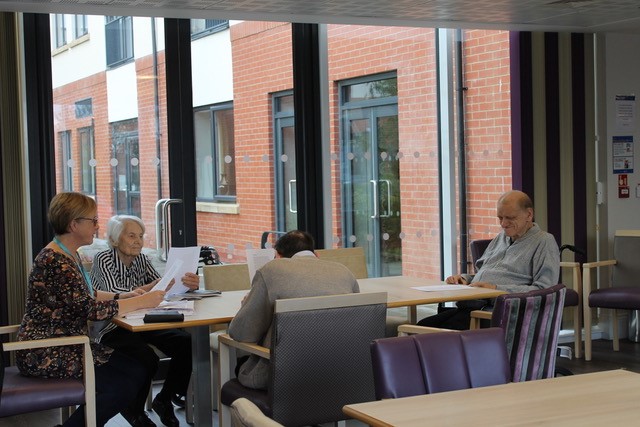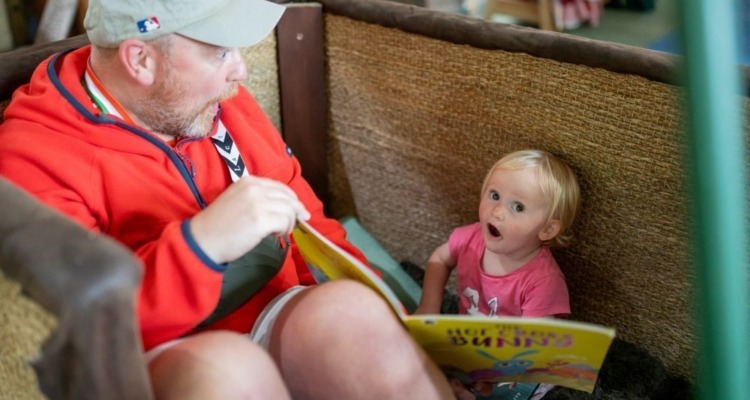‘I will never forget Alan and Jo, and the camaraderie they shared through reading together’
Leonie is a volunteer for The Reader in North Derbyshire, reading in a sheltered housing space in Chesterfield. In this Reader Story, Leonie tells us about her experience becoming a volunteer and starting a group.

Two years ago, at an unplanned crossroads in my life, I plucked up the courage to apply for training as a Reader Leader, funded by the Big Give.
Amazingly, my application was successful. I headed to Liverpool for the training at Calderstones Park, and a new chapter in my life began.
Reading has been a source of comfort and absorption for me since childhood, seeing me through the good times and the bad, but until then, I hadn’t appreciated that these benefits could be shared with others.
I hadn’t appreciated that these benefits could be shared with others
Since then, I have run two small but fantastic groups where I live in north Derbyshire.
It’s been a learning curve, but I’ve discovered new strengths and developed existing ones, and met some inspirational people along the way.
Early concerns about finding a venue for my first Shared Reading group were soon resolved when I approached the manager at Potter’s Place, a sheltered housing space in Chesterfield.
I had recently delivered a ‘writing for wellbeing’ project with a group of their residents and all of them were keen to attend a Shared Reading taster.
It’s a mixed group in every way: culturally, socially and educationally, so I had concerns early on about finding the right literature for everyone to get into.
But thanks to excellent literature support from The Reader, this has not been a problem. In fact, this has created a wonderful blending of ideas and sentiments with a group of residents who previously didn’t know each other - even though they live in the same place.
Our first poem, in November 2017 was Tell All the Truth by Emily Dickinson, and last week our eightienth poem was appropriately: It Ain’t What You Do, it’s What it Does to You, by Simon Armitage.
As I’m only able to do one session each month, the consensus was that we’d stick to poems and this has worked well so far.
One of the group members is a retired English teacher who is now visually impaired. Once we have read the poem through a couple of times, he always offers engaging reflections, and the rest of the group has come to value and respect his contributions.
He has brought several of his favourite poems by Gerard Manly Hopkins for us to share, and while some of the group members found the language hard to follow, they still enjoyed hearing him unpick some of the trickier phrases.
As well as submitting my reading records on The Reader website, I also keep a list of the poems read, and any relevant notes about what worked and what didn’t. I have found this invaluable to look back at and learn from.
There is usually a core of six people who all say it’s the one thing they really look forward to in the activity calendar.
I usually start with a short, rhythmic poem to warm up, then a trickier poem in the middle, then ending on something lighter, as I have found this works best with the dynamics of the group.
We have had to try a couple of different spaces within the building, none of which are ideal – if we want comfy chairs, we have to put up with background noise from the residents lounge; if we want peace and quiet then its plastic folding chairs, which aren’t ideal for the group.
On the plus side, the office staff are happy to photocopy the poems for us, which saves time and money.
Shortly after starting my first group, I was at a local writing group where I got chatting to a lady who works as a cook in a care home. She said their activities co-ordinator would love to hear about Shared Reading. You just never know where potential groups might come from once you start spreading the word!
You just never know where potential groups might come from
This second group, at Morton Grange Care Home, brought a new set of rewards and challenges.
Firstly, on the day and time I was available, there wasn’t a quiet room free in the building, so we had to make do with a Day Room and lots of background noise and interruptions.
Attendance was sporadic and many who came were unable to respond or even to hold a copy of the poem, but I did my best to include them. And there were many moving moments when a spark of recognition came through in a smile or a gesture.
The training videos on The Reader website were really useful in this regard. Two residents, who I called my ‘reading team’, attended almost every time and exchanged lots of wonderful thoughts and memories in response to the different poems.
I was sad to have to finish there after 18 months as other work commitments took over, but I will never forget Alan and Jo, and the camaraderie they shared through reading together, including Alan’s regular recital of The Eagle by Alfred Lord Tennyson - complete with actions and dramatic voice.
Since completing the training as a Reader Leader my confidence in working with groups has grown enormously and I’m grateful for the ongoing support of The Reader staff and the wonderful online resources.
I’ve discovered thought-provoking poems from around the world and across the centuries that have enhanced my learning and informed my own writing.
Thank you, to The Reader.
Get in touch and be part of the story...
Do you enjoy discovering and sharing great stories and poems? Love meeting new people? Want to make a difference in your local community? If so, Shared Reading could be just the thing for you. And you could be just the person for us. Find out more.
If you want to know more about becoming a Reader Volunteer, get in touch and discover how you can get involved: volunteer@thereader.org.uk
Share
Related Articles

Meet Reading Heroes Volunteer, Colin ‘Reading Heroes opened up the world of graphic novels…the kids and I would spend time joyfully hamming up our performances’
The UK’s largest Shared Reading charity is celebrating its amazing team of volunteers throughout June inspired by Volunteers’ Week 2025, Monday…

We cannot just tell parents to read more. To truly improve children’s futures through reading, we need to properly support the adults around them to do so.
Responding to the Department of Education's announcement that 2026 will be a Year of Reading, The Reader's Managing Director Jemma…

Invitation to Tender: Microsoft Dynamics 365 Development Partner
Microsoft Dynamics 365 Development Partner The Reader is focused on embracing digital technology by developing new products and new ways…


